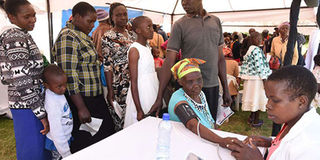Health sector needs urgent revamp

Residents of Uasin Gishu County take advantage of a free medical camp at Burnt Forest on August 4, 2019. Most Kenyans cannot access proper healthcare because the health system is defective. PHOTO | FILE | NATION MEDIA GROUP
What you need to know:
- Strengthening non-profit-making organisations in health policy development, service delivery and healthcare financing could be an important gateway to good health for all.
- To achieve universal health coverage, there is a need for joint advocacy by healthcare stakeholders amid pre-referendum talks.
Healthy people can work and enjoy the fruits of their labour and, by extension, improve their national economies.
Most Kenyans however cannot access proper healthcare because the health system is defective and dysfunctional — in a word, disordered!
An aspect of this disorder is prohibitive costs, which have driven many into despair and abject poverty.
A study commissioned by the Dutch embassy in 2016 found that “the amount of out-of-pocket (OOP) spending remains high, leading many people into poverty and posing a barrier to access healthcare”.
On quantity, quality and availability of healthcare workers, it notes that “Kenya has a high health worker shortage, mostly affecting the rural areas. Most health workers are employed in the private sector, in which the competition for doctors drives the costs of healthcare.”
It cites the challenges as improving the capacity of training, efficiency of health workers and reducing brain drain — where trained health workers look for greener pastures in the private sector and abroad.
INSURANCE
But all is not lost. The report praises Kenya as a leader in eHealth when it says: “ … Kenya has proven to be a front-runner in innovative ICT solutions in general and also in the health sector.
It is the only African country with a comprehensive eHealth strategy and the only country in the world with a multi-billion-dollar turnover of mobile money (M-Pesa) payments that is more and more being linked to paying for healthcare services.”
The most worrisome thing about Kenya’s health system is that it caters for a small percentage of the population. The report states authoritatively that the country “still only has a prepaid healthcare coverage of about 25 per cent. 75 per cent of the population does not have any health (insurance) cover and relies fully on out of pocket expenses …”
More than 50 years after independence, most Kenyans cannot access healthcare and common ailments such as typhoid, malaria, pneumonia, poliomyelitis, whooping cough, kwashiorkor and marasmus still kill them.
Every human being should lead a healthy and productive life. Health is recognised as a central concern in development.
REDUCED PROSPECTS
The 2010 “Kenya Health Systems Assessment” report noted that “NHIF covers 2.9 million Kenyans in the formal sector and an additional four million in the informal sector via the Health Insurance Subsidy Programme for the Poor (HISP)”.
It added that not even private insurance companies have a wider cover for private individuals.
In 2010, the number of people with private health insurance was 600,000. Today, some 1.5 million lives are covered via private insurance. There are about 20 companies that offer a health insurance cover.
The role of health in determining the economic prospects of the poor and marginalised has been significantly undermined by the society.
Health and wealth are coexistent; those with little or no access to the necessary resources are more likely to get sick.
Unhealthy people are more likely to have little or no capacity to seek the necessary resources. It is diseases that perpetuate poverty, leading to unsustainable depletion of resources; hence the need to delve deep into health and development issues in line with the ‘Big Four Agenda’.
BOLSTER AGENCIES
In marginalised areas, it is not unusual to have a nurse overseeing an entire hospital as its lab technician, clinical officer and other roles.
There is a growing concern that expired drugs are being openly prescribed. More than half of medication is inappropriately prescribed and sold, says the World Health Organisation.
Increasing disease prevalence necessitates health practitioners to prescribe and dispense drugs to patients. Unfortunately, at times, patients do not complete the dose as the medicines have expired.
The poorly-guarded and inefficient government and health professional regulatory bodies only serve to compound this problem.
Strengthening non-profit-making organisations in health policy development, service delivery and healthcare financing could be an important gateway to good health for all.
JOINT ADVOCACY
It is such entities that have been most vibrant in transforming facilities designed to serve the privileged few into systems of care for all.
To achieve universal health coverage, there is a need for joint advocacy by healthcare stakeholders, especially now, amid pre-referendum talks.
The campaigners can propose, for instance, returning the health sector to the national government as counties have failed to streamline it to give residents a health(y) value!
Mr Mwambonu is a business reporter with the ‘Daily Nation’. [email protected]




